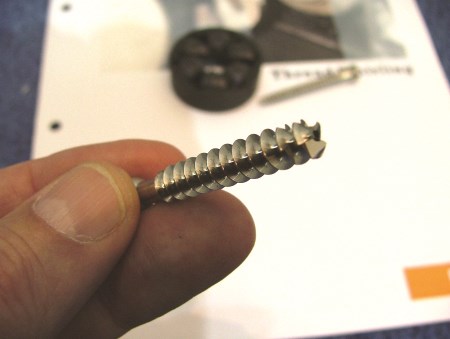The Precision Machining Industry and the PMPA
Our industry has grown, from the model of small family ownership to support the founding craftsman’s talents, to almost 4,000 establishments, many still closely held, generating more than $18 billion in annual production.
In 1865, Joseph R. Brown received patent number 46,521 for the first automatic screw-threading machine. That first automatic screw machine introduced the revolutionary ideas of mass production, along with form and dimensional repeatability to the manufacturing world. Today, as our world is on the brink of autonomous vehicles, we take for granted automatic heating and cooling systems where we live, as well as autopilot and cruise control in our aircrafts and vehicles. In our shops today, we use both cam-driven and CNC automatic machines to produce an endless variety of high precision, custom engineered component parts. Parts with extremely complex geometries are produced to tolerances of ten-thousandths (0.0001") or even millionths of a meter (1 micron). These parts are crucial to all of today’s technologies, especially those involved with electronics, transportation, mobility and those critical to human safety.
Our industry has grown, from the model of small family ownership to support the founding craftsman’s talents, to almost 4,000 establishments, many still closely held, generating more than $18 billion in annual production. NAICS 332721 (Precision Turned Products Manufacturing) is characterized by the production of parts on a custom order/contract order basis. According to the U.S. Census, we employ more than 100,000 people.
The Precision Machined Products Association is the leading association in North America representing the interests of the precision turned products manufacturing industry. Originally founded in 1933 as the National Screw Machine Products Association, we provide our member companies with a variety of products, services and networking opportunities to help them be more competitive, more compliant with ever-changing regulatory challenges, and more prepared to sustain their businesses through generational change. National and local meetings provide the opportunity for members to learn the latest developments in management, production and emerging technologies and compliance issues. Programs covering technical, quality, financial and operational benchmarking, human resource management, plant safety and environmental compliance are areas where our members find authoritative support. We have made a difference for our members and the industry in the area of governmental relations, tax reform and several regulatory issues.

PMPA manufacturing members (contract manufacturers or job shops) typically outperform the industry in areas of sales and sales-per-employee as well as experience an expense decrease in the areas of factory expense and total conversion costs as they grow their employment, sales and profitability. PMPA manufacturing member shops comprise about 6 percent of industry establishments, yet produce about 21 percent of industry shipments. Average sales-per-shop and per-employee are substantially higher than NAICS averages.
The efficiencies and productivity of automatic production that was unleashed by Joseph Brown in 1865 lives on in the shops of the Precision Machined Products Association. Sophisticated engineering, production, quality and inventory practices are used to assure customer satisfaction and part compliance with the strictest human safety critical standards and requirements. There is a card company that says, “When you care to send your very best.” The shops in the PMPA know exactly what that means – every day, every machine, every part and every shipment. Cars won’t run and aircraft will not fly if the machinists of the precision turned products industry don’t make it right. That is why we associate to share best practices, industry benchmarks and technical expertise. The whole world is counting on us to make it right.
Read more from PMPA:
-PMPA Member Horberg Industries Finds Success in its Longevity and Attention to Detail
-What Sparks Joy? Shop Edition
-Craftsman’s Cribsheet: What to Do When an Accident or Near-Miss Incident Without Injury Occurs in Your Shop
Related Content
Craftsman Cribsheet No. 119: Defeating the Hanging Cross-Hole Burr
Deburring is a tedious task that is better left to machines.
Read MoreCraftsman Cribsheet No. 126: AISI System of Identification
Source: PMPA Prior to the Society of Automotive Engineers taking responsibility for Steel Grade nomenclature in the United States (1995), the American Iron and Steel Institute determined U.S. standard steel grades in collaboration with SAE.
Read More‘Can You Hold This Tolerance?’ Is Not An Engineering Question
The implications of tolerances go far beyond mere technical compliance.
Read MoreMachining Unleaded Materials — Reliability is Possible
Leaded steel is no longer produced in the United States. How do shops approach unleaded brass and steel machining?
Read MoreRead Next
Do You Have Single Points of Failure?
Plans need to be in place before a catastrophic event occurs.
Read More5 Aspects of PMTS I Appreciate
The three-day edition of the 2025 Precision Machining Technology Show kicks off at the start of April. I’ll be there, and here are some reasons why.
Read MoreA Tooling Workshop Worth a Visit
Marubeni Citizen-Cincom’s tooling and accessory workshop offers a chance to learn more about ancillary devices that can boost machining efficiency and capability.
Read More










.jpg;maxWidth=300;quality=90)











